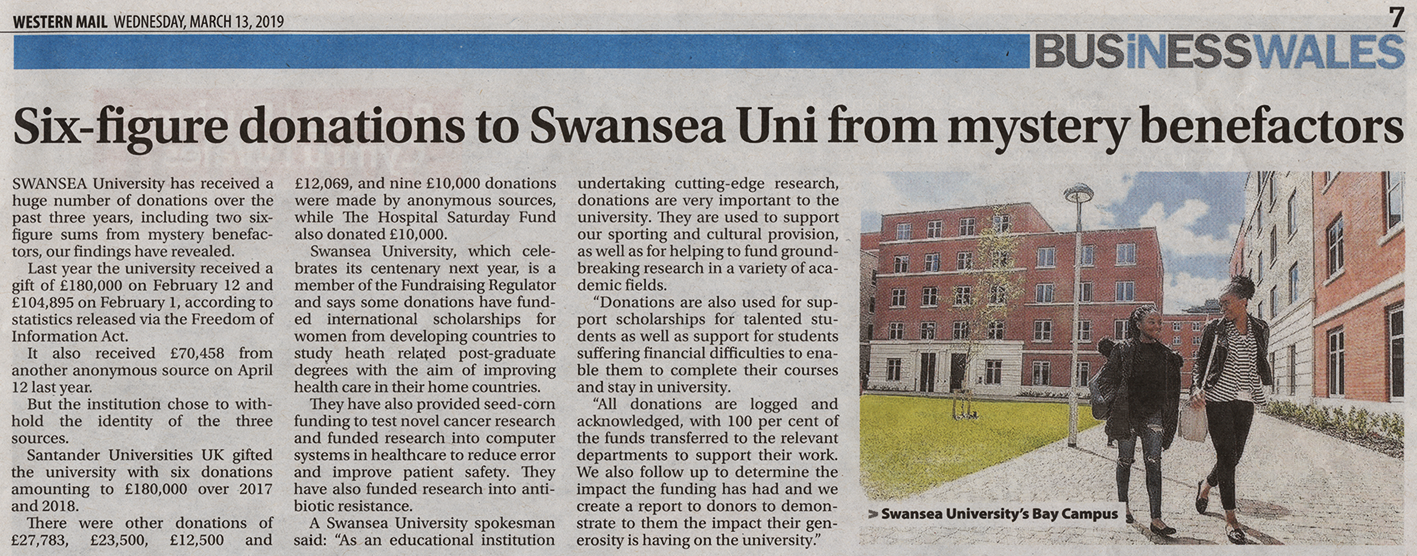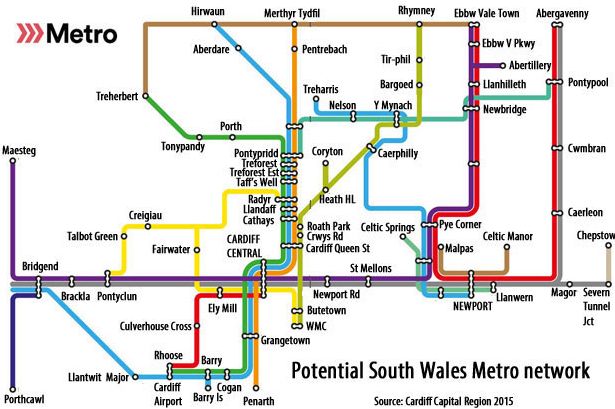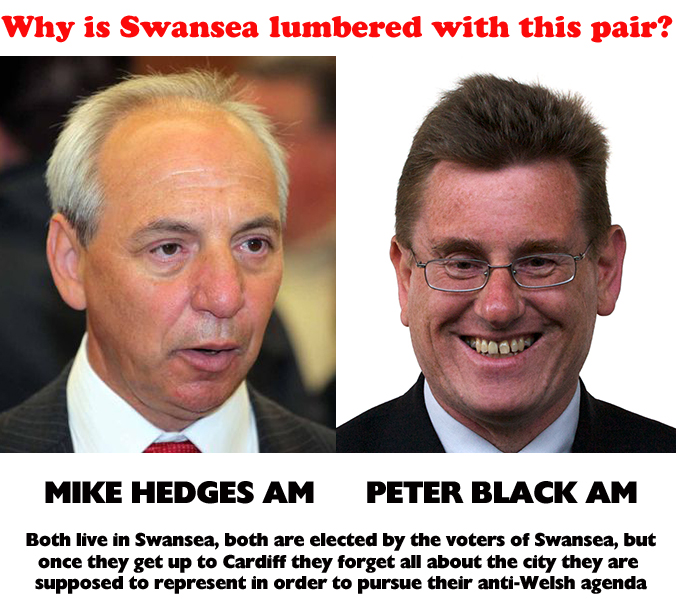![]() I hadn’t planned on writing this, but thinking about what’s happening to our major sporting bodies left me little alternative. It’s dressed up as reorganisation, or combatting sexism, misogyny, and other evils, but I believe these are a smokescreen for the true motivations.
I hadn’t planned on writing this, but thinking about what’s happening to our major sporting bodies left me little alternative. It’s dressed up as reorganisation, or combatting sexism, misogyny, and other evils, but I believe these are a smokescreen for the true motivations.
Don’t worry, I haven’t forgotten about the promised piece on Bute Energy. That will still come out early next week.
◊
FOOTBALL ASSOCIATION OF WALES
Let’s start with an announcement made last Monday, June 11. You can see a clip below, and here’s a link to the article that appeared on the Football Association of Wales (FAW) website.
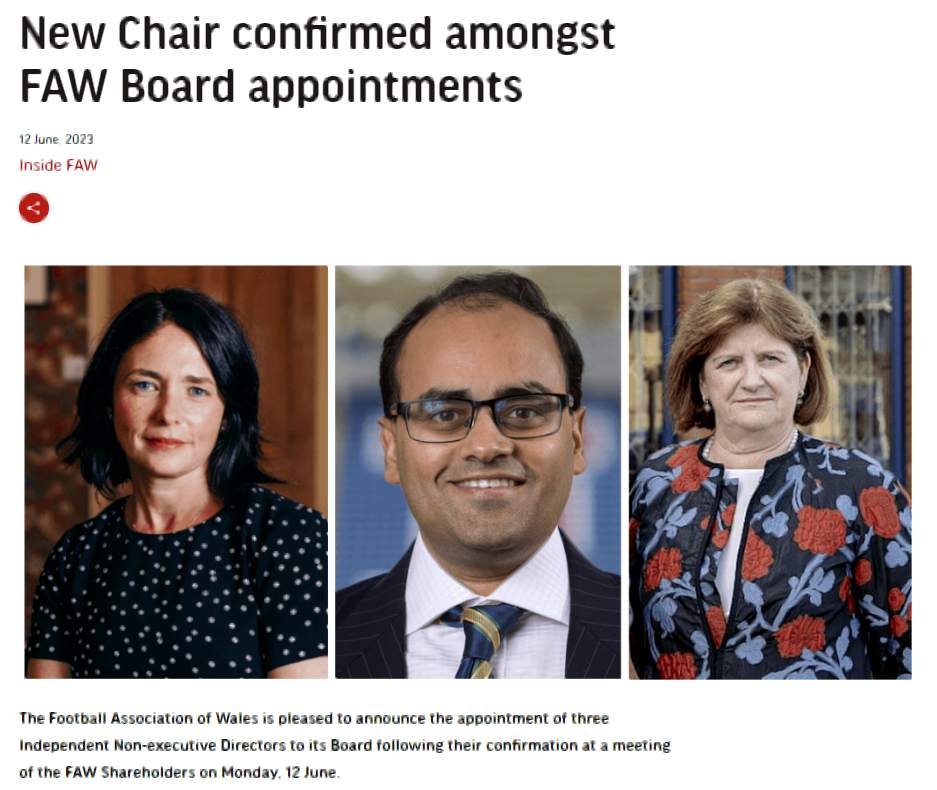
My first thought – betraying the parochial side to my otherwise angelic nature – was, “I don’t remember any of them playing for the Swans“. I immediately slapped myself on the wrist and went on to read the article.
So who are these Independent Non-executive Directors of the FAW?
∼
Chair Alys Carlton, on the left in the image above, was educated at Cheltenham Ladies College, Edinburgh University (French, Italian), and Nottingham Trent (Law).
She is clearly a ‘Welsh Government’ insider because nobody who wasn’t well-regarded in the Swamp would be ‘Vice Chair of Welsh Government’s Expert Panel on Supporting Entrepreneurial Women’. Nor would they be, ‘First Tier Judge – Mental Health Review Tribunal for Wales’.
Before branching out on her own, with Alys Carlton Consulting Ltd, in April 202o, Alys worked for Capital Law, one of the ‘Welsh Government’s favourite law firms, an outfit that sees a great deal of our money.
And I’m sure Capital Law has written to Old Jac after someone went running to them. “Tell him to stop being nasty!”
Here’s Alys Carlton’s Linkedin page. (Here in pdf format.)
Alys Siân Carlton is the daughter of the late Keith James.
∼
Next up is Sameer Rahman Syed, centre in the above image. Here’s his Linkedin info. (Here in pdf format.)
This guy would also appear to be well-connected with the movers and shakers in that city some 40-odd miles east of Swansea. I suggest that because he is also a non-executive director of the Millennium Stadium and Glamorgan County Cricket Club. The latter being the reason Wales has no national cricket team.
And after a career in ‘Data’ he too went solo, in April 2021, with Datamonet Ltd. Things seem to be going splendidly, with our boy as CEO and, er, sole employee.
∼
The third member of this troika is Dr Carol Bell. (No ding-dong jokes!) Though in her case, she was re-‘elected’.
A coalminer’s grand-daughter from Felindre, north Swansea, she made important contacts at Cambridge which may have helped her land a job with Rio Tinto on graduating.
A former investment banker in the energy field, now turned archaeologist, and another Welsh speaker. Here’s her Linkedin page (Here in pdf format.)
Dr Bell is as well connected in Corruption Bay as the other two, and perhaps well beyond the Bay. We see Millennium Stadium in her trophy cabinet too, along with a few intriguing appointments. Such as non-executive director at the Development Bank of Wales.
But what really caught my eye was Dr Bell being a director at BlackRock Commodities Income Investment Trust plc. Blackrock has been mentioned a few times on this blog; for its CEO, Larry Fink, is a leading Globalist, and big buddies with Bill Gates and Claus Schwab.
◊
WELSH RUGBY UNION
We begin this section with a piece from last Friday’s Llais y Sais. As you can see below, it deals with two appointments to the Welsh Rugby Union (WRU).

Richard Collier-Keywood is described as the WRU’s “first independent chair“. Which I take to mean that he was not elected by the Union’s member clubs, as has been done in the past.
The piece also tells us that these are “appointments“, but not who made them. Which is odd. And the WRU website makes it clear that Collier-Keywood is to take over from current chair, Ieuan Evans. So can we assume that the appointments have been made by the WRU Board?
Now, we all know who Ieuan Evans is, he’s one of our all-time great players, but most of you will be wondering, “Who the hell is Richard Collier-Keywood, and where by do he come from?”.
I can tell you it’s not from round by ‘ere. Though both sources are keen to tell us that his mother had some connection to Maesteg and he may have enjoyed an ice cream or two in Porthcawl.
I’ll have more for you on Richard Collier-Keywood later.
∼
Alison Thorne is another interesting appointment. Her Linkedin page will fill in more details. (Here in pdf format.) I draw particular attention to the most recent of her appointments, which you can see below.

Beyond any question of a doubt we are dealing with another denizen of the Swamp. A charming lady, no doubt, but as great-aunt Fastidia would say, in her characteristically earthy way: “Shit in the same latrine and you’ll share the smell“.
She even works for the ‘Welsh Government’ on public appointments!
And wearing a different hat, she’s the chair of the National Dance Company of Wales. Which – and I kid you not! – seeks “to deliver social change through dance“. Another way of saying, ‘Straight White men need not apply’.
Finally, she is the chair of trustees at housing association Barcud. This is interesting because, in theory, housing associations are now private companies. But a control-freak administration such as we see in Corruption Bay won’t give up control of anything.
A firm grip maintained by social housing bodies either having outstanding loans, or taking out fresh loans, or acquiring land from, the ‘Welsh Government’.
◊
WHAT’S IT ALL ABOUT?
If I tell you that former first minister Carwyn Jones was considered for the WRU chair job it should help you understand where we’re heading.
Maybe someone decided that giving Jones the job would have been too obviously political. Though on the plus side, he is Welsh, and knows something about rugby.
Instead, Richard Collier-Keywood was appointed. And it’s an odd appointment. As was suggested to me by someone who was in university with him.
My source told me the WRU’s new chair was a good tennis player in his younger days, with an interest in other racquet sports. But no interest in rugby; and Collier-Keywood never mentioned Wales, despite knowing that my source is 100% Welsh.
Strange that, for a man with a Welsh mam.
Let’s be clear. These are political appointments.
After creating what was reported by a loyal media as “turmoil” in our sporting bodies the ‘Welsh Government’, with the help of certain individuals ‘on the inside’, was able to engineer a situation that saw people parachuted in who are dependent on ‘Welsh Government’ patronage.
Which is quite an achievement, considering that both the Football Association of Wales and The Welsh Rugby Union are not public bodies but private companies.
In the case of the WRU influence can be exerted because there are two outstanding loans on the Millennium Stadium (October 2020 and March 2022) with “The Welsh Ministers of the Welsh Government“. So it can be claimed that the appointees are simply there to safeguard the public interest.
This is the model alluded to earlier with housing associations. “We lend you money and to safeguard our investment we’ll have a big say in the running of your organisation“. Tony Soprano would immediately understand that model.
But is it ethical to use public assets to exercise political control, and promote a political agenda lacking public support?
It’s less clear how Corruption Bay got its claws into the Welsh FA.
But the important point is that both the Football Association of Wales and The Welsh Rugby Union are very high profile organisations. Many Welsh people can be influenced by them. Controlling them therefore becomes politically desirable.
Not least because either or both might go ‘off-message’. With fans supporting the national football team singing Yma o Hyd some people were getting worried.
Talking of using our sporting associations to influence public opinion, I wonder what Billy Meredith or John Charles would have made of what you see below, from last Saturday’s Pride parade in Cardiff?
Incredible welcome from everyone @PrideCymru march for @FAWales showcasing that football is for everyone!
These outfits are incredible!!#PAWB pic.twitter.com/CAFZTWu6yJ
— Jason Webber (@WebberTJason) June 17, 2023
The tweet was put out by Jason Webber, who is – and you’d never have guessed! – ‘Senior Equality, Diversity, Inclusion & Integrity Manager at the Football Association of Wales’. If he’s the senior manager, then there must be lesser mortals doing similar work.
Yeah, that’ll help us qualify for Euros and World Cups.
My worry is that, “Football is for everyone” means that full-grown men pretending to be women will be allowed to play with and against young girls. And of course, they must also be allowed to share facilities.
Because on matters like this the ‘Welsh Government’ takes orders from Stonewall.
∼
What we see at the WRU and FAW are not isolated examples of political interference. For I’ve detected a growing trend of such ‘appointments’. One I wrote about earlier this year involved the then Brecon Beacons National Park Authority (BBNPA).
These appointments were justified as being done to promote inclusivity and diversity. Woman of colour, disabled man . . .
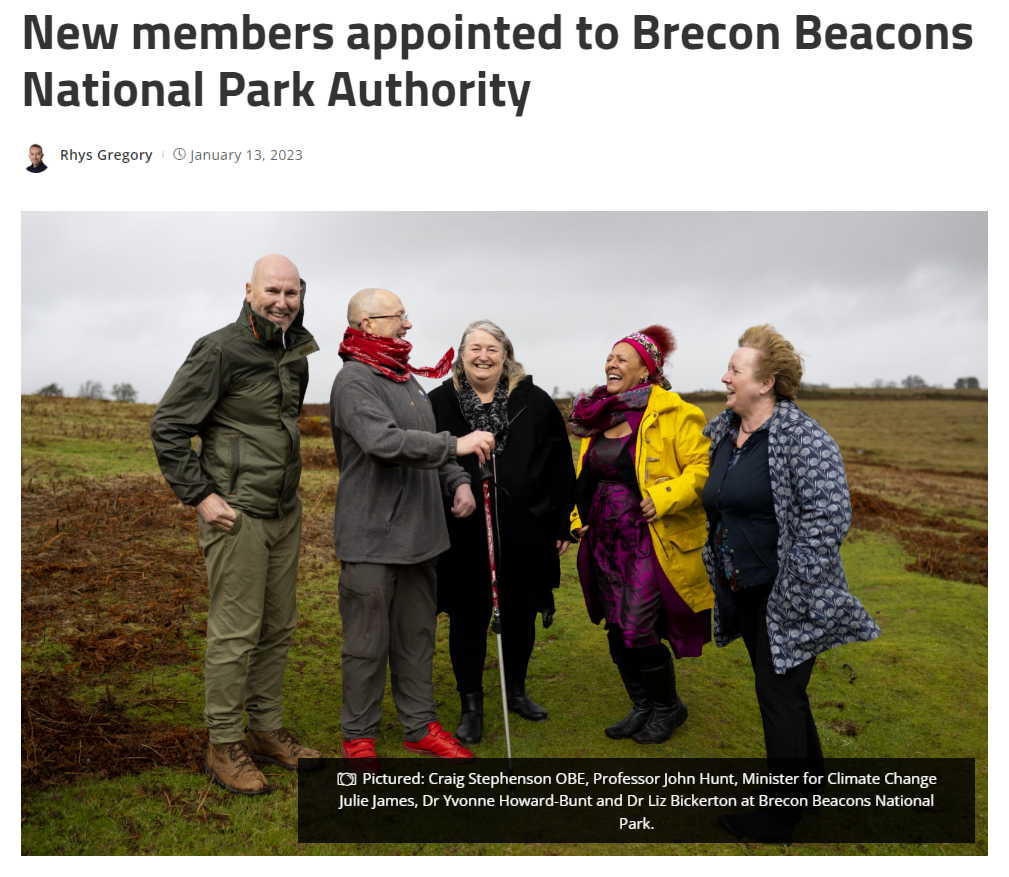
We then had a contrived and very public debate over the change of name to Bannau Brycheiniog. Which served to draw attention away from the fact that what had really changed was that Labour had now taken full control of the BBNPA.
So, on one level, these manoeuvrings increase the ‘Welsh Government’s control over public and other bodies. And then, given what I explained in my previous blog piece, it also gives easier access to pressure groups, whose diktats the clown show in the Bay will dress up as its own policies.
But there’s also a third element that becomes obvious the more we look at these appointments.
◊
THOSE WHO WOULD BE KINGS
The rash of appointments being made in Wales obviously extends the influence of the ‘Welsh Government’, for the Swamp is the immediate and obvious beneficiary; and then there are the pressure groups, but it doesn’t end there.
The appointments are also being made in order to implement ESG. And if those letters mean nothing to you, let me explain that they stand for Environmental and Social Governance.
Companies, charities and other bodies are expected to sign up to ESG and, by so doing, follow the Globalist agenda. Here’s how the World Economic Forum (WEF) explains it.
Who could object to such desirable ambitions? Er, me. The awkward bugger at the back.
Because as with so much else produced by the WEF, you have to poke around behind the words to see what they really mean. Read the panel below, from the WEF website I’ve just linked to, and then I’ll explain it.

” . . . social justice protests have drawn attention to gaps in diversity, equity, and inclusion; and the impacts of climate change and the importance of environmental sustainability are becoming harder, if not impossible, to ignore.”
“Social justice protests” is a euphemism for the riots that caused death and destruction in so many US cities following the death of George Floyd during a botched police arrest.
And then we get “climate change” and and “environmental sustainability“, straight out of the climate alarmists’ handbook.
Which ties in neatly with Dr Carol Bell of the FAW working for Blackrock.
And it explains Alison Thorne of the WRU delivering “social change through dance“. (Did youse ever in yer natural read such sententious bollocks!)
The terpsichoreans seeking to deliver this social change can be found – in case you’re minded to join! – at Dance House, which is in the Millennium Stadium.
Where else!
◊
SUMMING UP
The self-styled ‘Welsh Government’ is taking control, through appointees, and by other means, such as funding, of as many organisations as it possibly can.
Which means that a political party gaining roughly one fifth of the available votes will soon exert a stranglehold on Welsh life. With Drakeford and his sorry troupe of inadequates just puppets operated by pressure groups and Globalists lacking any mandate at all.
For betraying Wales in this way the so-called ‘Welsh Government’ will get a pat on the head from Uncle Claus in Davos. And then everybody’s happy – ‘Welsh Government’, pressure groups, and World Economic Forum.
But how do you feel about it?
♦ end ♦







